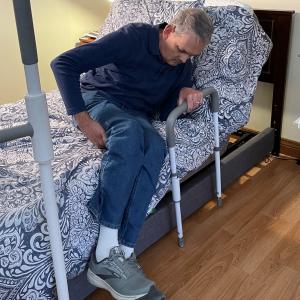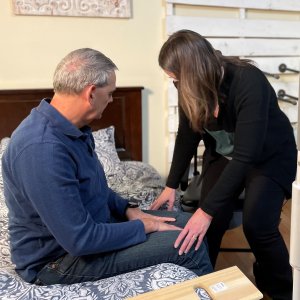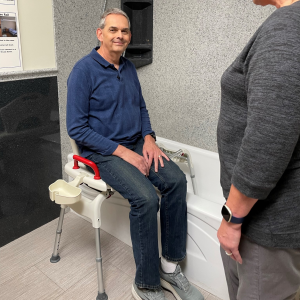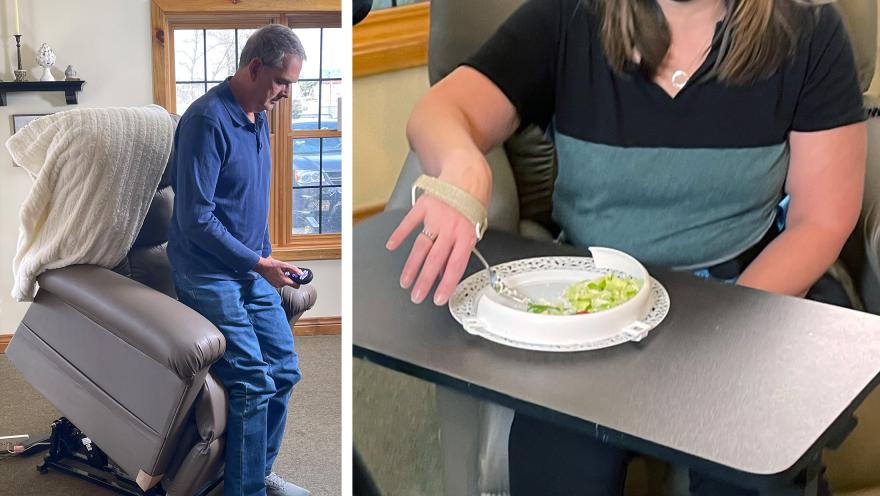In recognition of Occupational Therapy Month, we are shining a spotlight on the practice and the critical role it plays in helping people living with ALS manage their daily living activities and maintain their independence.
Occupational therapists are key members of the clinic team for individuals living with ALS. As ALS progresses, most people gradually lose their ability to use their hands and their arms as their muscles weaken. Occupational therapists help to provide expertise and creativity to help patients better manage daily activities for as long as possible.

Occupational therapy (OT) is focused on developing or maintaining the physical skills needed to perform everyday tasks. For example, an occupational therapist may help you find new ways to brush your teeth or recommend equipment to make your daily-living activities easier.
“Occupational therapy aims to help people successfully complete the functions of daily life and to live their life to the fullest,” says Elizabeth Tatum, Occupational Therapist at the Outpatient Rehabilitation Department and the Phil Smith ALS Clinic at Holy Cross Hospital. “We assess a person holistically to identify the deficits limiting them from engaging in the things that they want and need to do on a daily basis.”

Elizabeth says when working with ALS patients, she begins by assessing range of motion, strength, fine motor skills, energy levels and ability to complete activities of daily living such as dressing, bathing, grooming, feeding, toileting, and mobility. Once an evaluation is completed, the focus shifts to initiating a good home exercise program along with education on energy conservation and how to implement these techniques into daily life.
Elizabeth also asks patients to rate the level of difficulty they have with their activities of daily living, from hardest to easiest. Together they work toward solutions and interventions necessary to complete that particular activity.
“This may be to incorporate the use of adaptive equipment or use of adaptive techniques or positions,” Elizabeth said. “Each ALS patient presents differently and there is no protocol. Understanding the correlation between the patient’s deficits and their success level with a certain activity is the foundation for being able to adapt, create, and improve quality of life for these patients.”
Strategies to Help with Everyday Activities, one in a series of videos recently developed by The ALS Association to help people with ALS manage the challenges of the disease, focuses on many of the strategies and equipment available to help people living with ALS and their caregivers as mobility decreases.

Whether it’s adapting a person’s environment, helping a person manage or regain skills after injury, or adapting a task and or type of equipment used, occupational therapy is critical for helping people living with ALS remain independent for as long as possible. And while it can look different across the settings where they work, such as in hospitals, schools, outpatient clinics, nursing homes, or in the community, the goal is always to optimize and promote an improved quality of life.
To continue to learn more about ALS and follow stories about people living with the disease in the community, follow our blog at ALS.org/blog.


Comments
My mother was diagnosed with ALS in May 2018. I never heard of ALS before that dark, sad and painful day we were told that my mother has it and there was no cure for it. We learned that my mother will fight hard difficult battle with ALS. However, how quick this battle started and caused us to scramble looking for OTS, PTS and speech therapists was heart ranching. I am grateful for those professionals who came through to guide us help our mother retain her independence as much as was possible. OTS are grate problem solvers, they try to provide best solutions possible and transform lives. My mother’s biggest wishes were to do her daily activities on her own as much as she could. With the help of OTS, that was possible even though that was short lived as ASLs assaults increased on her beautiful body and soul. I am hoping a world without ALS and wishing well for those who assaulted by it and their loved. I also want thank you to those professionals whom try to make a deference for ALS patients.
Recently diagnosed, I'm loosing my mobility and continue to fall . Everything is harder
So sorry, Byron. My heart goes out to you.
Join the conversation. Please comment below.